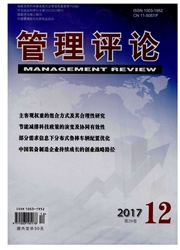

 中文摘要:
中文摘要:
在全球气候变暖的背景下,我国洪涝灾害的发生及其影响日趋严重,如何制定适应洪涝灾害等极端气候的政策和措施急需开展实证研究。探讨农户采用适应性抗洪措施的现状及影响他们采用这些适应性措施的主要因素,为相关领域的研究和决策者提供实证依据。基于全国6个省的大规模实地调查数据,采用Logit模型分析了影响适应性措施采用的决定因素。研究发现,面对洪涝灾害,85%的农户采用了以非工程类措施为主的相应的适应性措施。为了提高农户的适应能力,三分之一的村得到了上级提供的抗洪预警信息。计量经济模型分析结果表明,政府在灾前和灾后给农户提供抗洪预警信息对农户采用适应性措施能起积极的促进作用,同时社区和农户的一些自然和社会经济条件对农户采用适应性措施也会产生显著影响。依据研究结果,最后讨论了相关的政策含义。
 英文摘要:
英文摘要:
Under global warming, China is suffering from increasingly serious flood.Designing appropriate adaptation policies to flood and other extreme weather events requires rigorous and empirical analysis.The over all goal of this study is to examine effectiveness of policies and impact of other factors on farmers' adaptation to flood.Based on a large-scale household and village survey in six provinces nationwide, the econometric method was used to identify the determinants of adaptation measures against flood.The survey results show that 85 per cent of rural households have taken adaptation measures ,most of which non-engineering,against flood.In order to improve households'adaptive capacity ,one third villages received the early warning information service.Re gression analysis reveals that government policies play an active role in releasing early warning information. Mo reover, farmers' adaptation to flood is associated with flood prevention infrastructures and characteristics of their households and local communities.The oaoer concludes with several oolicv imolications.
 同期刊论文项目
同期刊论文项目
 同项目期刊论文
同项目期刊论文
 期刊信息
期刊信息
